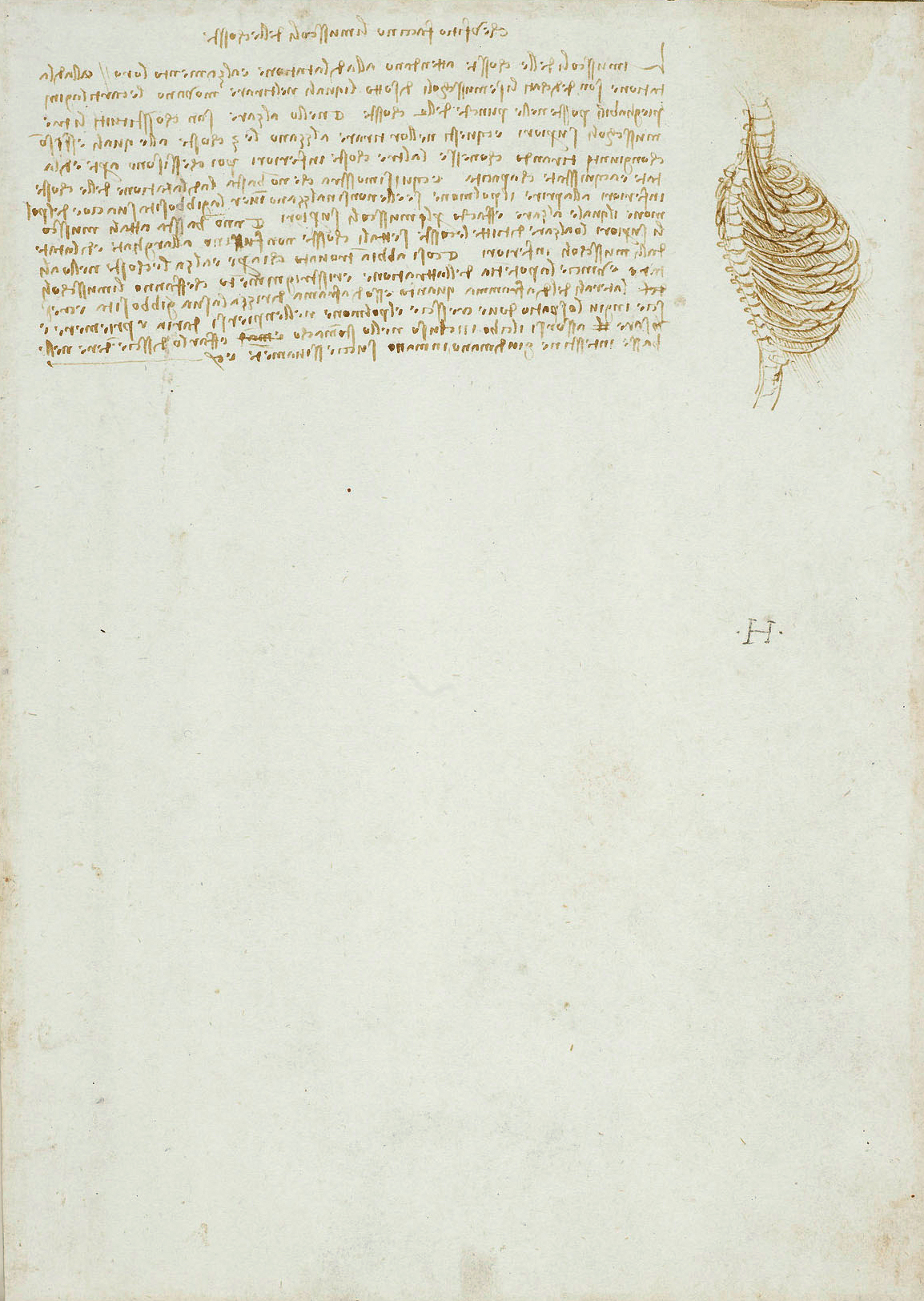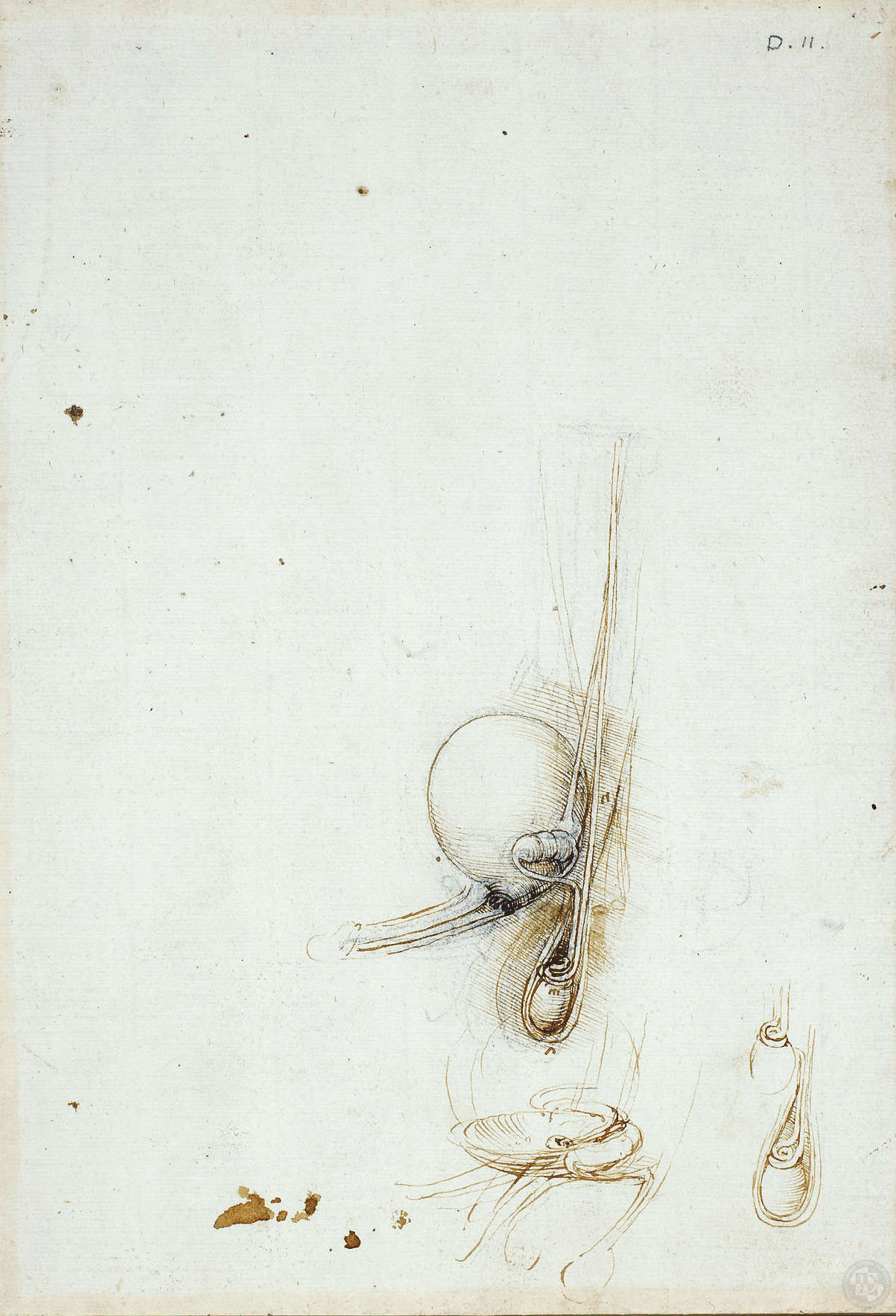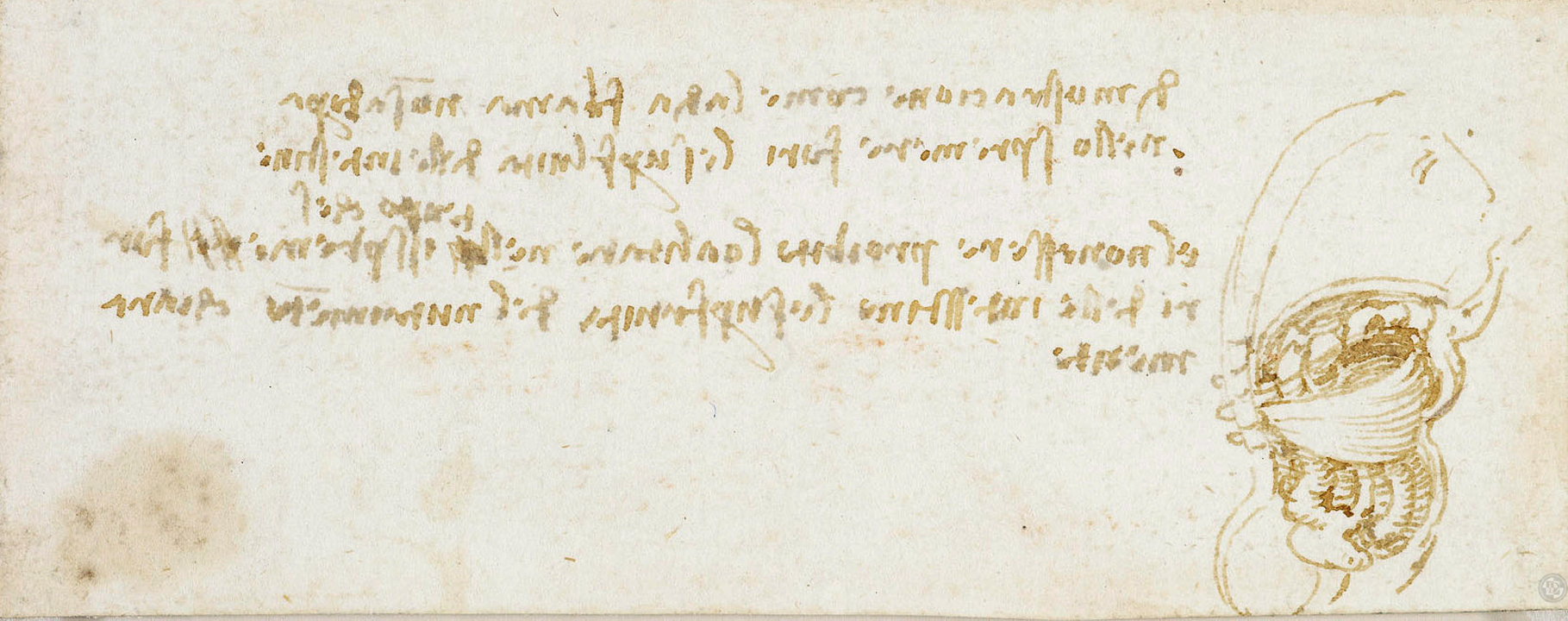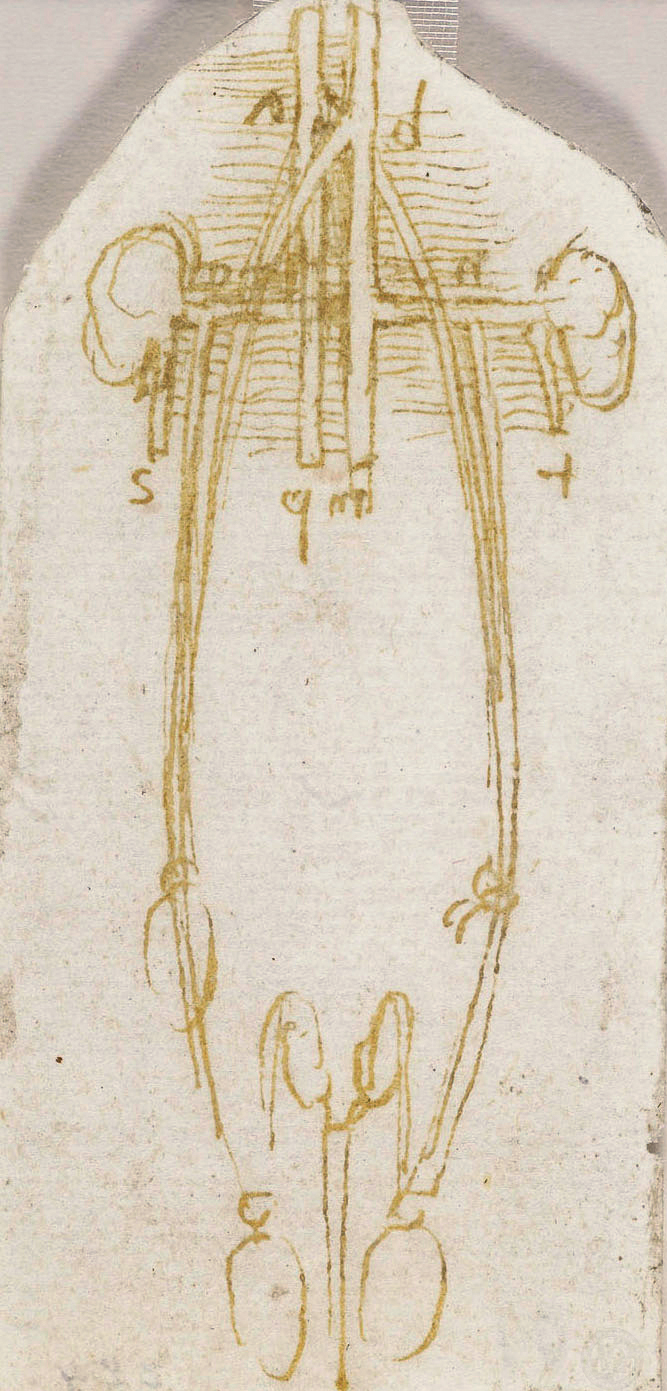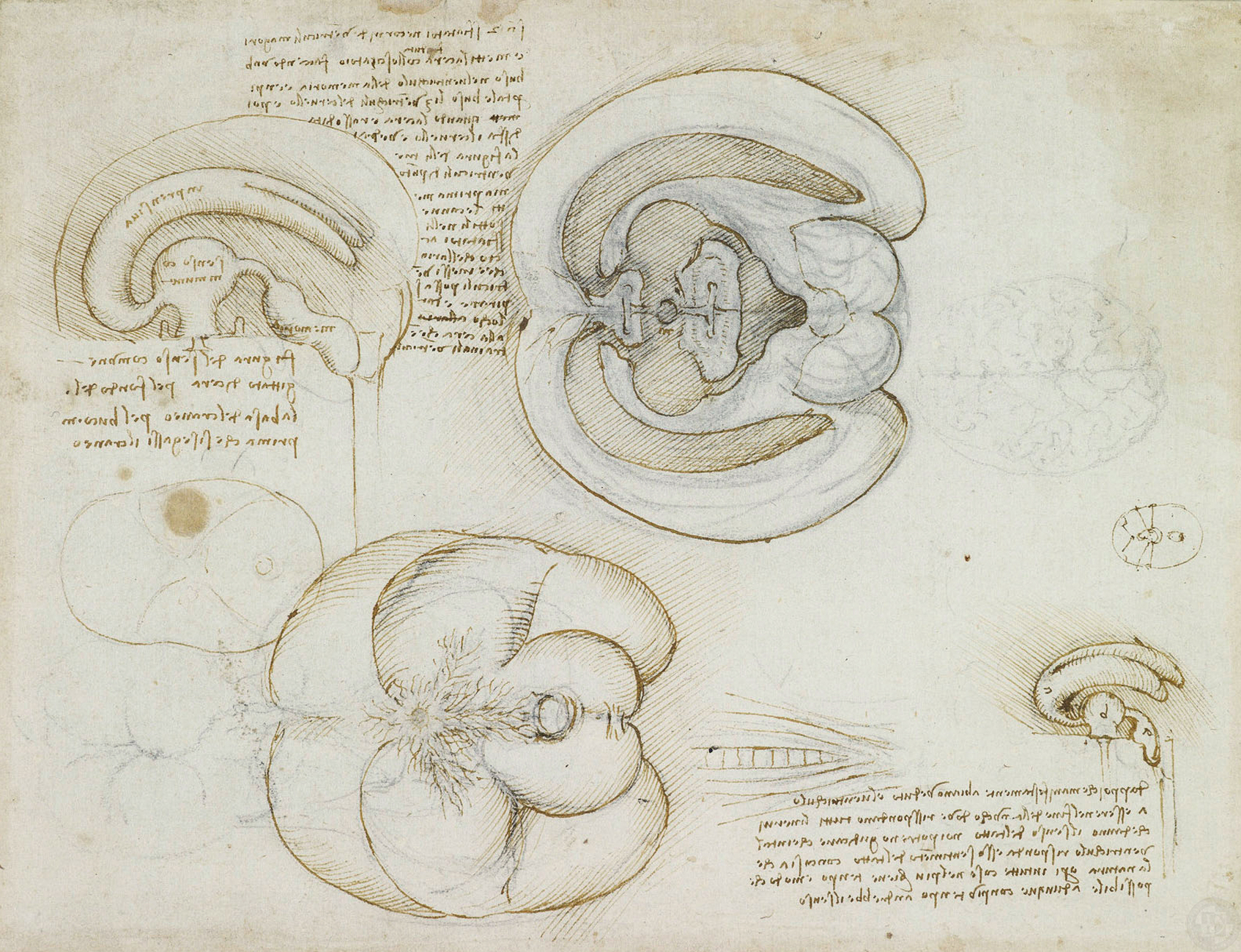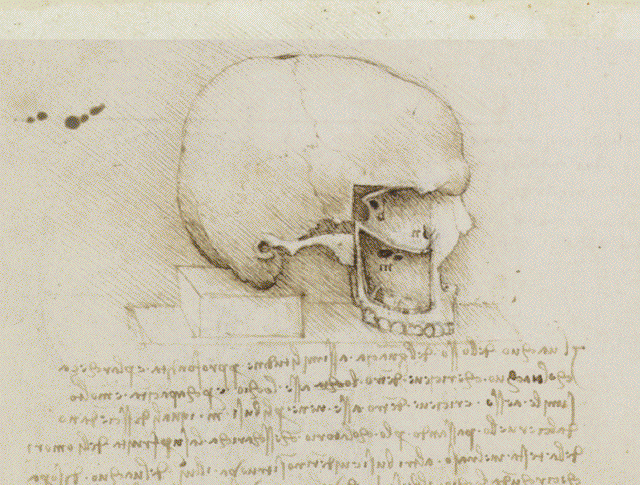
Anatomy
A guide to Leonardo's studies about human anatomy.
"I reveal to men the origin of the first, or perhaps second cause of their existence."
Anatomy
Leonardo's studies on the human body were nothing short of amazing. Even today we are finding just how accurate he was in his sketches - by comparing them to MRI machines. He was the first to diagnose heart disease and dissected over 30 bodies. This was not acceptable during his life time and partly accounts for not publishing his studies and sketches. This page has some examples of his sketches and notebooks writings about Anatomy but there are links to his full notebooks. More of his Anatomy sketches will be uploaded soon! -D 10/24/2015
‘Leonardo started to discover the anatomy of the human body at the time he was apprenticed to Andrea del Verrocchio, as his teacher insisted that all his pupils learn anatomy. As he became successful as an artist, he was given permission to dissect human corpses at the hospital Santa Maria Nuova inFlorence. Later he dissected in Milan at the hospital Maggiore and in Rome at the hospital Santo Spirito (the first mainland Italian hospital). From 1510 to 1511 he collaborated with the doctor Marcantonio della Torre (1481 to 1511). In 30 years, Leonardo dissected 30 male and female corpses of different ages. Together with Marcantonio, he prepared to publish a theoretical work on anatomy and made more than 200 drawings. However, his book was published only in 1680 (161 years after his death) under the heading Treatise on painting. Leonardo also dissected cows, birds, monkeys,bears, and frogs, comparing their anatomical structure with that of humans.’
"I wish to work miracles;
—it may be that I shall possess less than other men of more peaceful lives, or than those who want to grow rich in a day. I may live for a long time in great poverty, as always happens, and to all eternity will happen, to alchemists, the would-be creators of gold and silver, and to engineers who would have dead water stir itself into life and perpetual motion, and to those supreme fools, the necromancer and the enchanter.
And you, who say that it would be better to watch an anatomist at work than to see these drawings, you would be right, if it were possible to observe all the things which are demonstrated in such drawings in a single figure, in which you, with all your cleverness, will not see nor obtain knowledge of more than some few veins, to obtain a true and perfect knowledge of which I have dissected more than ten human bodies, destroying all the other members, and removing the very minutest particles of the flesh by which these veins are surrounded, without causing them to bleed, excepting the insensible bleeding of the capillary veins; and as one single body would not last so long, since it was necessary to proceed with several bodies by degrees, until I came to an end and had a complete knowledge; this I repeated twice, to learn the differences.
And if you should have a love for such things you might be prevented by loathing, and if that did not prevent you, you might be deterred by the fear of living in the night hours in the company of those corpses, quartered and flayed and horrible to see. And if this did not prevent you, perhaps you might not be able to draw so well as is necessary for such a demonstration; or, if you had the skill in drawing, it might not be combined with knowledge of perspective; and if it were so, you might not understand the methods of geometrical demonstration and the method of the calculation of forces and of the strength of the muscles; patience also may be wanting, so that you lack perseverance. As to whether all these things were found in me or not the hundred and twenty books composed by me will give verdict Yes or No. In these I have been hindered neither by avarice nor negligence, but simply by want of time. Farewell."
How the five senses are the ministers of the soul
"The soul seems to reside in the judgment, and the judgment would seem to be seated in that part where all the senses meet; and this is called the Common Sense and it is not all-pervading throughout the body, as many have thought. Rather is it entirely in one part. Because, if it were all-pervading and the same in every part, there would have been no need to make the instruments of the senses meet in one centre and in one single spot; on the contrary it would have sufficed that the eye should fulfil the function of its sensation on its surface only, and not transmit the image of the things seen, to the sense, by means of the optic nerves, so that the soul-for the reason given above-may perceive it in the surface of the eye. In the same way as to the sense of hearing, it would have sufficed if the voice had merely sounded in the porous cavity of the indurated portion of the temporal bone which lies within the ear, without making any farther transit from this bone to the common sense, where the voice confers with and discourses to the common judgment. The sense of smell, again, is compelled by necessity to refer itself to that same judgment. Feeling passes through the perforated cords and is conveyed to this common sense. These cords diverge with infinite ramifications into the skin which encloses the members of the body and the viscera. The perforated cords convey volition and sensation to the subordinate limbs. These cords and the nerves direct the motions of the muscles and sinews, between which they are placed; these obey, and this obedience takes effect by reducing their thickness; for in swelling, their length is reduced, and the nerves shrink which are interwoven among the particles of the limbs; being extended to the tips of the fingers, they transmit to the sense the object which they touch. The nerves with their muscles obey the tendons as soldiers obey the officers, and the tendons obey the Common Sense as the officers obey the general. Thus the joint of the bones obeys the nerve, and the nerve the muscle, and the muscle the tendon and the tendon the Common Sense. And the Common Sense is the seat of the soul, and memory is its ammunition, and the impressibility [imprensiva] is its referendary since the sense waits on the soul and not the soul on the sense. And where the sense that ministers to the soul is not at the service of the soul, all the functions of that sense are also wanting in that man's life, as is seen in those born mute and blind."
How nerves sometimes operate by themselves without any command from other functioning parts of the soul.
The idea or imagination is the rudder and bridle of the for the thing imagined moves senses the sense.
To pre-imagine is to imagine things which will be.
To post imagine is to imagine things past.
The liver is the distributor and dispenser of vital nourishment to man, The bile is the familiar or servant of the liver which sweeps away and cleans all up the dirty superfluities of nourishment left after it has been distributed to the parts of the body by the liver,
You will understand the windings of these intestines properly if you inflate them. And remember that after you have drawn them from four aspects so arranged, you draw them from four other aspects in such a way that through their enlarged open spaces you can understand the whole, that is the differences in their sizes.
Of the penis, which when it is hard is big, long, dense and heavy and when it is soft it is small, short, soft, that is soft and feeble. This makes one judge that here its flesh is not supplemented by wind but by arterial blood. This I have seen in dead men who have this member erect, for many die thus, particularly those hanged. Of these I have seen the anatomy, all of them having great density and hardness, and being full of a great quantity of blood which has made the flesh very red inside, and in other cases outside as well as inside. And if the adversary says that such a large quantity of flesh has grown through wind causing enlargement and hardness as in a ball with which one plays such wind gives neither weight nor density but makes flesh light and rarefied. Besides one observes that the erect penis has a red glans which is a sign of the inflow of blood and when it is not erect this glans has a whitish surface."
Intestines
HOW THE BODY OF ANIMALS IS CONSTANTLY DYING AND BEING RENEWED.
The body of any thing whatever that takes nourishment constantly dies and is constantly renewed; because nourishment can only enter into places where the former nourishment has expired, and if it has expired it no longer has life. And if you do not supply nourishment equal to the nourishment which is gone, life will fail in vigour, and if you take away this nourishment, the life is entirely destroyed. But if you restore as much is destroyed day by day, then as much of the life is renewed as is consumed, just as the flame of the candle is fed by the nourishment afforded by the liquid of this candle, which flame continually with a rapid supply restores to it from below as much as is consumed in dying above: and from a brilliant light is converted in dying into murky smoke; and this death is continuous, as the smoke is continuous; and the continuance of the smoke is equal to the continuance of the nourishment, and in the same instant all the flame is dead and all regenerated, simultaneously with the movement of its own nourishment.
"If you will cut an onion through the middle you will be able to see and enumerate all the coats or rinds which circularly clothe the center of this onion.
Similarly if you will cut through the middle of the head of a man you will fist cut the hairs, then the scalp, then the muscular flesh and pericranium, then the cranium; and inside, the dura mater,; the pia mater and the brain; then again the pia mater and dura mater and the rete mirabile and then the bone, their foundation."
Cut like an Onion
- "Our life is made by the death of others."
- In dead matter insensible life remains, which, reunited to the stomachs of living beings, resumes life, both sensual and intellectual.
Reproductive Systems:
The origin of the penis is placed on the pubic bone. it is so supported in order to resist the forces active in coitus. If this bone did not exist these forces would return the penis backwards on meeting resistance, and it would often enter more into the body of the operator than into that of the operated.
The child turns with it's head downwards on the separation of the cotyledons.
The child lies in the uterus surrounded by water because heavy things weigh less in water than in air, and so much the less as the water is more viscous and greasy. Further such water distributes its own weight with the weight of the baby over the whole base and sides of the uterus.
Uterus which is seen from inside.
The female has her two spermatic receptacles in the form of testicles - ovaries - and her sperm is first blood, like that of the male. But both one and the other on reaching the testicles take on generative power. But not one without the other. Neither the one nor the other (sperm) is kept in the testicles but the one in the ...
See which first goes into the urinary canal (urethra) either the mouths of the spermatic ducts or the mouth of the urinary vessel (bladder) But I believe that that of urine is first in order to be able to clean and then wash out the sperm stuck in the urinary canal.
Uterus which is seen from outside.
uterus and the other, that is the male, is kept in the two ventricles a b which are attached to the back of the bladder.
The spermatic receptacles of the male and female are in contact with the posterior side of the bladder, but those of the male are more attached. "
About the Penis
- “The penis does not obey the order of its master, who tries to erect or shrink it at will, whereas instead the penis erects freely while its master is asleep. The penis must be said to have its own mind, by any stretch of the imagination,”
- “A man who is ashamed to show or name the penis is wrong. Instead of being anxious to hide it, man ought to display it.”
And this old man, a few hours before his death, told me that he had lived a hundred years, and that he did not feel any bodily ailment other than weakness, and thus while sitting upon a bed in the hospital of Santa Maria Nuova at Florence, without any movement or sign of anything amiss, he passed away from this life. And I made an autopsy in order to ascertain the cause of so peaceful a death, and found that it proceeded from weakness through failure of blood and of the artery that feeds the heart and t he other lower members, which I found to be very parched and shrunk and withered ; and the result of this autopsy I wrote down very carefully and with great ease, for the body was devoid of either fat or moisture, and these form the chief hindrance to the knowledge of its parts.
The other autopsy was on a child of two years, and here I found everything the contrary to what it was in the case of the old man. The old who enjoy good health die through lack of sustenance. And this is brought about by the passage to the mesaraic veins becoming continually restricted by the thickening of the skin of these veins; and the process continues until it affects the capillary veins, which are the first to close up altogether; and from this it comes to pass that the old dread the cold more than the young, and that those who are very old have their skin the colour of wood or of dried chestnut, because this skin is almost completely deprived of sustenance. And this network of veins acts in man as in oranges, in which the peel becomes thicker and the pulp diminishes the more they become old. And if you say that as the blood becomes thicker it ceases to flow through the veins, this is not true, for the blood in the veins does not thicken because it continually dies and is renewed. (Windsor MSS. Dell' Anat. Fogli)
THE NATURE OF THE VEINS
The origin of the sea is the contrary to that of the blood, for the sea receives within itself all the rivers, which are entirely caused by the aqueous vapours that have ascended up into the air; while the sea of the blood is the source of all the veins. OF THE NUMBER OF THE VEINS The vein is one whole, which is divided into as many main branches as there are principal places which it has to nourish, and these branches are subdivided in an infinite r.
OF THE MUSCLES WHICH MOVE THE TONGUE
No member needs so great a number of muscles as the tongue,—twenty-four of these being already known apart from the others which I have discovered; and of all the members which are moved by voluntary action this exceeds all the rest in the number of its movements. And if you shall say that this is rather the function of the eye, which receives all the infinite varieties of form and colour of the objects set before it, and of the smell with its infinite mixture of odours, and of the ear with its sounds, we may reply that the tongue also perceives an infinite number of flavours both simple and compounded ; but this is not to our purpose, for our intention is to treat only of the particular movement of each member. Consider carefully how by the movement of the tongue, with the help of the lips and teeth, the pronunciation of all the names of things is known to us; and how, by means of this instrument, the simple and compound words of a language arrive at our ears; and how these, if there were a name for all the effects of nature, would approach infinity in number, together with all the countless things which are in action and in the power of nature; and these would not be expressed in one language only, but in a great number of languages, and these also would tend to infinite variety, because they vary continually from century to century,
